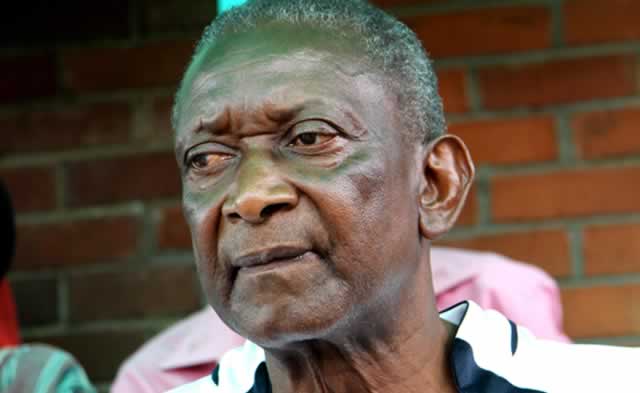By Eddie Chikamhi
A life journey dedicated to football finally came full circle when legend Freddy Mkwesha, who died this week, was laid to rest at his rural home in Goromonzi.

Mkwesha, who devoted more than five decades of his lifetime to the game, was given a befitting send-off as thousands of people, who included the who’s who of Zimbabwean football, yesterday besieged Chinyika Village to pay their last respects to one of Zimbabwe’s football luminaries.
The former Zimbabwe international died on Tuesday morning, just four days before celebrating his 74th birthday. Mkwesha had not been feeling well for some time after he was diagnosed with diabetes.
Friends and relatives were joined by football administrators, current and former players, and supporters notably from Dynamos and CAPS United, who came together to see him off to his final resting place.
Former players, among them Moses Chunga, Callisto Pasuwa, Brenna Msiska, Sunday Chidzambwa, Eddie Muchongwe, Charlie Jones, Biggie Zuze, Clayton Munemo, Norman Mapeza, Tichaona Diya, Dumisani Mpofu, Nesbert Saruchera, Misheck Chidzambwa and Albert Mabika attended the burial.

There were also administrators who included ZIFA chief executive Jonathan Mashingaidze, Premier Soccer League chairman Twine Phiri, former Eagles president Stanley Kudenga, ZIFA Northern Region Division One chairman Willard Manyengavana, members of the Dynamos board of directors led by Bernard Marriot and the club’s executive fronted by president Kenny Mubaiwa.
Current players and coaches from both the Premiership and lower divisions also left their busy schedules to be with the Mkwesha family on this solemn occasion.
Speaker after speaker spoke glowingly of the man who is recorded in Zimbabwe’s history books as the first ever black person from this country to play professional football in Europe when he joined Portuguese side Sporting Braga in 1966.
Among Mkwesha’s friends who spoke at the burial was legendary musician Oliver Mtukudzi, who encouraged parents to support their children to realise their full potential. Mtukudzi said Mkwesha’s life was worth celebrating because of his accomplishments.
He said more players in the mould of Mkwesha could be produced in this country if parents change their mindset towards sport. DeMbare president Mubaiwa also gave a moving tribute. And speaking on the sidelines of the burial, Mkwesha’s contemporary George “Mastermind” Shaya said death has robbed him of a friend.
Mkwesha and Shaya had a profound friendship which dated back to the 1960s. Shaya said he will miss the days he had with his former colleague as the two old buddies often hung around together at Raylton Sports Club, where Mkwesha ran an eatery, discussing football and current affairs.
“We used to meet and talk a lot about the heyday and comparing with the current generation if there are any differences. He had passion in helping Zimbabwean football develop as he demonstrated with his works.
“Mkwesha was a great source of wisdom. Besides that, he was someone who was always there to help anyone who approached him. “I feel the football people in Zimbabwe have lost a great source of knowledge. We all know he was the first black person to play abroad and with that experience, he was very instrumental as a coach, introducing some new concepts on how football is conducted in professional leagues,” said Shaya.
Grassroots development was one of his major areas of success. One of his prodigies — Gift Muzadzi — said Mkwesha was very instrumental in nurturing many players especially in the 1990s.
“I started working with him when I was playing in the Under-17s. He championed the development of the junior leagues and this helped our generation which produced stars players like Stewart (Murisa), Lloyd Chitembwe and Alois (Bunjira). It’s very different to what is happening these days. We no longer have robust juniors programmes.
“Mkwesha would encourage the juniors to play and that’s why football was exciting in those days. The other thing I like about him was that he was candid and did not tolerate wayward behaviour.
“There are some games he would approach you and say ‘vakuru tahwina hedu but hapana chamatamba.’ That was him. “But the bottom line is, there are many players who passed through his hands and personally I feel if there was a Heroes’ Acre for footballers, then this is one person who deserved a 21-gun salute for his contribution,” said Muzadzi.
Dynamos team manager Richard Chihoro said Mkwesha was a passionate man when it came to football as demonstrated by his initiatives towards junior development both at Dynamos and CAPS United. Mkwesha coached CAPS United from 1984 and also worked as team manager in the 1990s before assuming duties in the junior structures.
He later returned to Dynamos to take up a position in the board of directors and was instrumental in setting up the youth structures. Triangle United assistant coach Zuze said he learnt many things from the late football icon.
“This is a man that we looked up to because of his leadership qualities. He is one person who would unify people. If you look at the composition of people we have here they include former players from different teams like Dynamos, CAPS United, Black Rhinos and other teams. “His biography shows that he was a very disciplined man who knew what he wanted to achieve in his career.
“There was no time when we heard that he had problems with players, coaches or referees. These are some of the qualities that we should emulate from this great man,” said Zuze. The Herald






